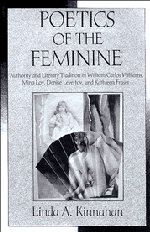 Poetics of the Feminine
Poetics of the Feminine Book contents
- Frontmatter
- Contents
- Acknowledgments
- Introduction
- 1 “The Full of My Freed Voice”: Williams and Loy, Feminism and the Feminine
- 2 In The American Grain: Proclaiming a Feminine Ground
- 3 Denise Levertov: The Daughter's Voice
- 4 Kathleen Fraser: A Tradition of Marginality
- Conclusion: Paterson and the Question of Authority
- Notes
- Bibliography
- Index
- CAMBRIDGE STUDIES IN AMERICAN LITERATURE AND CULTURE
1 - “The Full of My Freed Voice”: Williams and Loy, Feminism and the Feminine
Published online by Cambridge University Press: 08 January 2010
- Frontmatter
- Contents
- Acknowledgments
- Introduction
- 1 “The Full of My Freed Voice”: Williams and Loy, Feminism and the Feminine
- 2 In The American Grain: Proclaiming a Feminine Ground
- 3 Denise Levertov: The Daughter's Voice
- 4 Kathleen Fraser: A Tradition of Marginality
- Conclusion: Paterson and the Question of Authority
- Notes
- Bibliography
- Index
- CAMBRIDGE STUDIES IN AMERICAN LITERATURE AND CULTURE
Summary
As the final poem in William Carlos Williams's 1917 Al Que Quiere!, “The Wanderer” articulates Williams's aesthetic and philosophical tenets, commenting on the collection it concludes and looking forward to poetry that will follow. Confronting the poet's relationship to the rapidly transforming modern world, the speaker asks, “How shall I be a mirror to this modernity?” (CP1 108). Generating the poem and engrossing the poet, the question derives not from his own mind but from “Her mind” (108), the mind of the poem's “marvelous old queen” (111), the “horrible old woman” (110) who initiates the young poet into a “new wandering” (117), a “new marriage” (111) with the earth, and who empowers his voice as poet.
This repulsive and tattered character resonates with an explosive power to reveal, through her speech and action, a new world to the poet. The poem begins with this question of modernity, “Which she had put on to try me,” and sets up the expectation that the question will be answered (108). Indeed, in the second section, “Clarity,” the poet affirms that “certainly somewhere here about us / I know she is revealing these things” that make up “the beauty of all the world” (109). However, in “recreating the whole world” for the poet, the old woman changes not the world but the poet's method of seeing and hearing (109).
- Type
- Chapter
- Information
- Poetics of the FeminineAuthority and Literary Tradition in William Carlos Williams, Mina Loy, Denise Levertov, and Kathleen Fraser, pp. 19 - 74Publisher: Cambridge University PressPrint publication year: 1994


